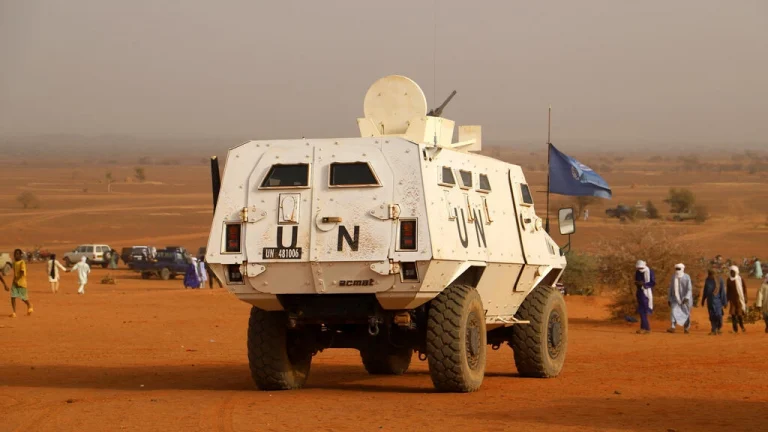
Mali said on Thursday that it would be stopping rotations of the United Nations’ peacekeeping deployment for reasons related to “national security.” This is the latest development in the complicated relationship between the governing junta and foreign allies.
According to the statement made by the country’s Ministry of Foreign Affairs in Bamako, the rotations of the MINUSMA mission are being halted, including those that have already been organised.
According to a statement, the suspension will continue until a meeting is conducted to “enable the coordination and control” of the rotation of contingents. This information was provided by the organisation.
According to Ivory Coast, the troops are part of something known as National Support Elements (NSE), which is a UN protocol that allows peacekeeping contingents to engage outside contractors for logistical responsibilities.
According to the information provided by the Ivory Coast, these service members represented the seventh rotation of this programme when they were stopped and detained after arriving at Bamako airport on a chartered aircraft.
The statement that Mali released on Thursday did not make any mention of the detention of the Ivorians, nor did it provide a date for negotiations to address the rotations of MINUSMA.
However, it reassured the United Nations mission that Mali will “work assiduously to establish circumstances favourable to the removal of this suspension of rotation.” This is a vital stage in the process of allowing the deployed contingents to guarantee the correct execution of MINUSMA’s mandate.
The notice did not provide any more explanation as to why the change was being made.
On the other hand, it occurred four days after Mali detained 49 Ivorian troops whom it subsequently referred to as “mercenaries” with the intention of overthrowing the military-led government of the nation.
The United Nations Multidimensional Integrated Stabilization Mission in Mali (MINUSMA) was established in 2013 to assist one of the world’s poorest nations in coping with the effects of a violent Islamist onslaught.
It is one of the largest peacekeeping missions carried out by the United Nations, with over 12,200 troops and 1,700 police being dispatched from approximately 50 nations.
On June 29, its mandate was extended for another year, despite the fact that Mali “firmly opposed” calls to enable investigators of human rights to have freedom of movement as part of the mission.
El-Ghassim Wane, the leader of MINUSMA, said on July 7 at a press conference that the mission required the “support and cooperation of the Malian government.” He also called for “continuous dialogue” in order to clear up any “misunderstandings.”
After what Mali said was a reorganisation of the procedure for allowing flights over conflict zones, the African Union Mission in Mali (MINUSMA) aviation activities were halted for several days in the middle of January.
Following what the authorities described as “fruitful conversations,” the suspension was removed.
The United Nations Multidimensional Integrated Stabilization Mission in Mali (MINUSMA) conducts frequent flights between Mali and the countries that border it in order to carry out supply missions and transport injured combatants.
In the meantime, after a breakdown in ties between Paris and Bamako, the French anti-jihadist mission known as Barkhane is expected to finish withdrawing from Mali over the next few weeks.
France asserts that the Russians the junta has brought in are really members of the infamous Wagner group’s paramilitary wing, while the junta claims that the Russians it has sent in are military advisors.
Human Rights Watch (HRW) said in April that in the previous month, Malian military and suspected Russian fighters were responsible for the slaughter of about 300 people in the central region of Mali.
As a result of Mali’s military regime’s inability to adhere to the timeline it had set for returning power to civilians, its West African neighbours imposed economic sanctions on the country during the first half of 2022.
Mali was the site of two unsuccessful military coups, one in August 2020 and the other in May 2021, which has resulted in a political crisis that overlaps with a continuing security crisis.
After becoming involved in a regional uprising in the north of Mali in 2012, jihadists expanded their campaign to include the central area of the nation as well as the neighbouring countries of Burkina Faso and Niger.
There have been thousands of civilian casualties, over two million people have been forced to flee their homes, and there has been significant economic damage to nations that are already among the poorest in the world.